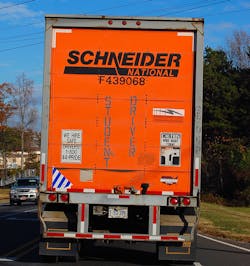FMCSA committee set to work on entry-level driver training rule
The last highway bill, Moving Ahead for Progress in the 21st Century (MAP-21), “that the training regulations address knowledge and skills for motor vehicle operation, specific requirements for hazmat and passenger endorsements, create a certificate system for meeting requirements, and require training providers to demonstrate that their training meets uniform standards.”
The committee is FMCSA’s brainchild to reach a consensus rule that makes everybody happy. It calls this step a “negotiated rulemaking.”
David Heller, director of safety and policy for the Truckload Carriers Assn., wrote in his October 2014 Safety 411 column, which appears monthly in Fleet Owner, that the agency has been trying for 10 years to implement a rule.
“Those 10 years seem like forever since the agency first addressed entry-level driver training by requiring that drivers, in order to obtain their CDL, must receive training in the following areas: driver qualifications, hours of service, driver wellness, and whistleblower rights. To echo what most of you are likely thinking right now, it is clear that that mandate has not really worked out,” he wrote.
A negotiated rulemaking is a process that brings concerned parties to the table in the hopes that a rule is crafted that will satisfy everyone and avoid litigation that could tie up implementation for years.
Many doubt that this process will succeed.
“ATA supports strong, performance-based entry-level driver training standards,” Dave Osiecki, ATA’s executive vice president and chief of national advocacy told Fleet Owner, back in August. “Truck drivers are professionals and they should be held to high standards of training and safety before being allowed behind the wheel.”
Because of the lack of data and research on training standards, Osiecki believes FMCSA will have trouble proving a cost benefit to any driver training rule. “As a result, it is difficult to see how a negotiated rulemaking gets FMCSA past the cost-benefit hurdle, regardless of the agency’s good intentions,” he said.
We are about to find out.
For the record, the first meeting of the committee, which is open to the public, will take place on Feb. 26-27, 2015, at the Hyatt Regency Crystal City, in Arlington, VA. The meeting will go from 9 a.m. to 4:30 p.m.
Copies of all ELDTAC materials and an agenda will be made available in advance of the meeting at http://www.fmcsa.dot.gov/eldtac.
FMCSA sought out interested parties to serve on the committee. Each member chosen will serve for up to a single, two-year term.
Committee members are:
- Larry W. Minor, Associate Administrator for Policy, FMCSA
- Peter Kurdock, Director, Regulatory Affairs, Advocates for Highway and Auto
- Safety
- Kevin Lewis, Director, Driver Programs, American Association of Motor
- Vehicle Administrators
- Clyde Hart, Vice President, Government Affairs, American Bus Association
- Lauren Samet, Assistant Director, Paraprofessional and School-Related
- Personnel, American Federation of Teachers, AFL-CIO
- Ed Watt, Director, Special Projects, Amalgamated Transit Union, AFL-CIO
- Boyd Stephenson, Director, Hazardous Materials and Commercial Licensing
- Policy, American Trucking Associations
- Ron Wood, Washington, DC, Volunteer Coordinator, Citizens for Reliable and
- Safe Highways
- Bob Tershak, Master Trooper, Virginia State Police, Commercial Vehicle Safety
- Alliance
- Carl Spatocco, Regional Vice President, Educational Affiliates, Commercial
- Vehicle Training Association
- David R. Parker, Senior Legal Counsel, Great West Casualty Company
- Al Smith, Director, Safety and Security, Greyhound Lines, Inc.
- LaMont Byrd, Director, Health and Safety, International Brotherhood of
- Teamsters
- Margaret Rohanna, School Bus Program Manager, Massachusetts Registry of
- Motor Vehicle Division, Massachusetts Department of Transportation
- Martin Garsee, President, National Association of Publicly Funded Truck
- Driving Schools
- Jim Edwards, Washington Representative, National Association of Small
- Trucking Companies
- Charlie Hood, President, National Association of State Directors of Pupil
- Transportation Services
- Bob Ramsdell, Chief Operating Officer, West, Durham School Services,
- National School Transportation Association
- Scott Grenerth, Director, Regulatory Affairs, Owner-Operator Independent
- Drivers Association
- David Money, Chairman, Board of Directors, Professional Truck Drivers
- Institute
- Louis Spoonhour, Senior Advisor for CDL Programs, Stevens Transport
- Bryan Spoon, Owner-Operator, Spoon Trucking
- David Heller, Director, Safety and Policy, Truckload Carriers Association
- John Lannen, Executive Director, Truck Safety Coalition
- Ken Presley, Vice President, Industry Operations, and Chief Operating Officer,
- United Motorcoach Association
- Ellen Voie, President and CEO, Women in Trucking

